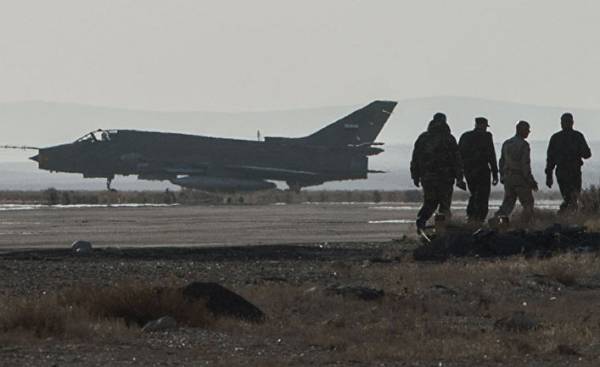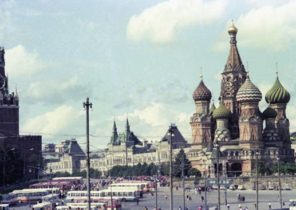
The rivalry between Washington and Moscow for influence in conditions of peace increases the risk of a wider war, which could begin in an incident.
Not for the first time appear frightening omens direct us-Russian confrontation in Syria, which in the worst case can escalate into a third world war. Everything happening today is reminiscent of the indirect conflict between the superpowers in the last years of the cold war, but with the added elements of risk, as rules and formal channels of communication are largely no longer apply.
In recent times an alarming situation due to the fact that the armed forces of the United States the plane was shot down by Syrian government forces, after Russia said that in the future it will consider any American aircraft to the West of the Euphrates as a potential target. Russia also announced that it terminates the Russian-American “hot line” designed to prevent incidents in Syrian airspace. The United States said that their actions were aimed to protect opposition forces fighting against the Islamic state (banned in Russia organization). Russia asked the question: on what basis the United States strikes by government forces of a foreign state?
The next day the United States accused Russia that its aircraft made dangerous proximity in the sky over the Baltic sea, and, according to the American side, in the region there’s been dozens of similar incidents. The impression is inexorably increasing tension and increasing risks along all separating East and West boundaries. And it is only a matter of time before it becomes a situation where any mistake may cause a direct collision.
However, the most dangerous place continues to be Syria, partially because of the complexity of the situation. Although this is in part because the war is approaching the final phase. President Bashar al-Assad seems confident that he can regain power over all of Syria. Talk about the partition, new borders, Autonomous regions and the like in a great measure ceased. The city of Aleppo is in government hands, the battle for Raqqa continues, but Islamic state controlled territory in Syria and Iraq — is reduced.
This probably explains why now for the United States and Russia has become more difficult to claim that their main goal in Syria is to fight against the Islamic state, and the less hope remains that they will be able to agree on a common approach. It is obvious that the conflict in Syria, based on its current state, is related, first, to the future of this country and, secondly, to the competition for dominant influence in the region — a competition in which players are Turkey and Iran. Could this be the reason that the United States, apparently, have become more assertive?
Russian objectives in Syria were clear from the beginning of her open military intervention that began in September of 2015 (even if Washington and some of its allies refused to see them). It is true that, being a long-standing ally of Syria, Russia has some loyalty to Assad. It is true that it regards Syria as the place where she can recover some of the influence that it had in the middle East the Soviet Union. However, such considerations are always secondary in comparison with Russia’s determination to keep Syria as a single state. For Moscow, Iraq and Libya are examples of what Syria with appropriate support should be avoided. Russian loyalty to Assad has been secured, since he was the only person able to maintain the unity of Syria. If there was some kind of opposition, Russia could leave him in the lurch. However, the opposition has never been unified enough to represent a credible alternative — even with the assistance she received from the United States and other countries. Moscow is putting pressure on Assad, trying to get him to agree to hold elections, and with some form of power sharing, but first, to end the military conflict. Priority remains the unity and the handling of Syria.
In contrast, the United States position seems, politely put, inconsistent. When the President was Barack Obama, the United States supported a variety of opposition groups and insisted — although John Kerry, the then Secretary of state, showed flexibility on the fact that Assad’s departure must be a precondition for any settlement. Many believed that the coming to power of Donald trump may indicate a sharp change in policy towards Syria. On the one hand, it hopes to improve relations with Russia, suggested the possibility of a negotiated settlement. On the other hand, trump promised that the United States would not intervene in foreign wars, and also the impression that he does not consider Syria a zone of vital interests of the United States. It seemed that the United States will stand idly by as Assad will use his victory in Aleppo and hurry to establish control over the rest of the country. However, in fact, no change in policy of the United States. The rapprochement with Moscow has not begun due to Washington’s anti-Russian hype. Trump has decided — or was persuaded to do it — to enact the proposed Obama, and not his own “red line”, and then ordered the bombing of the airfield of the Syrian government in response to the evidence provided about the performance of a chemical attack against the civilian population. The United States continues to support rebel groups to such an extent that the us military late last week was even shot down a Syrian plane. At least in this case it is about mixed messages.
One explanation may be overall disarray in the US administration, where many positions remain unfilled, and hostility toward trump is not reduced. Another reason could be a feeling — both in Washington and in Moscow — that the end is really close, and that Russia will maintain or increase its influence, while the United States needs to define its intentions. Another explanation may be a deep — and dangerous — hostility trump against Iran.
None of the above is not particularly comforting. Some relief may be that a sequence of Russia is easy to read. But if we are talking about the beginning of the final phase, it can be the most dangerous period since the us-Russian rivalry for influence in conditions of peace increases the risk of accidental war.






